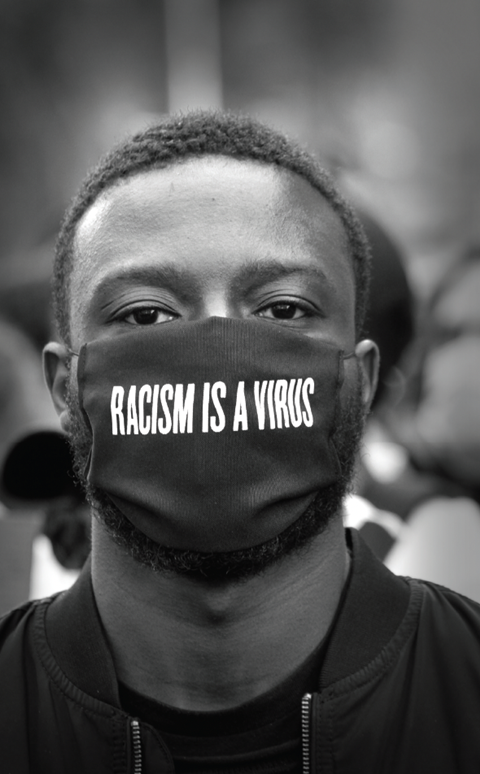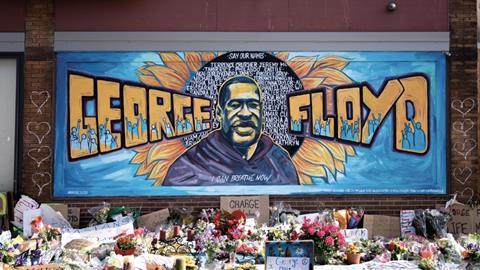The death of George Floyd has awakened us to racial injustice, says Chine McDonald, and now Christians must take action to dismantle white supremacy wherever they find it
In May, a police officer knelt on the neck of George Floyd, a black Christian in Minneapolis, for eight minutes and 46 seconds, until he died. During the ordeal, which was captured on film by a bystander, Floyd cried out for his mother. He said over and over again the words: “I can’t breathe.”
Imagine the brutality it takes for you to kill another human being while they’re begging for mercy in this way. Imagine the hatred. Imagine the sense of impunity. In the weeks since Floyd’s death, I’ve often wondered how he must have felt in those final few minutes of his life, knowing that it would end in the same way he had probably seen far too many black lives end – with the same kind of police brutality. I wonder how he felt, knowing that because of the stereotypes societies hold about black men being criminals, he was going to die.
Floyd was described by others as a “gentle giant”, and he was known for his involvement in Christian ministry work and for leading a basketball community outreach programme. It shouldn’t matter that he was a Christian, but the reality of who he was further serves to show us the danger of negative portrayals and assumptions about black people.
In the days following his death, Floyd’s beliefs, faith and actions came under intense scrutiny, as Snopes, the fact-checking site, reported: “[there were a] wave of claims online about Floyd’s alleged arrests and incarcerations before his death — mostly among people who seemed to be searching for evidence that either the actions by the Minneapolis police officer who choked Floyd were justified, or memorials to honor him were unnecessary.”
Floyd did not deserve to die in such an undignified way. His criminal record – and his Christianity – are secondary to that fact.
IMAGINE THE BRUTALITY IT TAKES FOR YOU TO KILL ANOTHER HUMAN BEING WHILE THEY’RE BEGGING FOR MERCY
Recalling the footage, my attention sometimes turns to the three other police officers who stood by and watched as their colleague killed a man in front of their very eyes. Why did they not intervene? Why did they not cry out that what their colleague was doing was wrong?
I believe there are three possible reasons: 1) they did not think his actions were wrong 2) they were indifferent to his actions, or 3) they knew his actions were wrong but were, for some reason, afraid of speaking up – perhaps afraid of the perpetrator, perhaps not wanting to rock the boat, perhaps not seeing it as their place to intervene.
PASSIVITY
I believe the scene mirrors the situation in which the Church has found itself for centuries when it comes to racial justice. Churches have watched as atrocities have been carried out against black people, and in those moments have been presented with a choice: to passively stand by, or to take action and defend what is right.
As Jemar Tisby writes in The Color of Compromise: The truth about the American Church’s complicity with racism (Zondervan): “Throughout the course of US history, when Christians had the opportunity to decisively oppose the racism in their midst, all too often, they chose silence. They chose passivity. The refusal to act in the midst of injustice is itself an act of injustice. Indifference to oppression perpetuates oppression.”
Occasionally, of course, the Church has not been the bystander, but the perpetrator. For centuries, the Bible was used to justify white supremacy and a caste-based system of race. Extreme racist groups such as the Ku Klux Klan were at various times made up of churchgoers and church leaders.
I don’t believe this is where we are now. I don’t believe followers of Jesus who take the gospel seriously can be racist, or it makes a mockery of the faith upon which we stand; a belief in a God who created all people in his image, who reconciled us to himself through the cross and in which we look forward to a kingdom coming when all things will be made new. That vision of a new heaven and a new earth found in Revelation specifically cites that every tribe and nation will be represented (7:9). That God loves every one of us equally – no matter our race – is not something that is up for debate. Is it?
Progress on racial justice has been hampered at times, however, by a defensiveness or denial from many majority-white spaces over the years, some of whom criticise any speaking out about the racism that they see in the Church and in the world as stoking division, or reliving the past.
Progress has been slow because some of us are more interested in arguing against identity politics than recognising the injustices that have been done to our brothers and sisters over centuries. It’s possible to do both, of course, but there are few examples of church leaders modelling this well.
Progress has also been slow because, far too often, we understand racism to mean solely the overt hatred of and violence towards other races. Perhaps we have lulled ourselves into a false sense of progress by choosing to eradicate certain offensive racial slurs from our vocabulary.
Make no mistake, overt racism does exist. Behind closed doors, people are still referring to black people in derogatory and outdated terms; and in front of our eyes, black people are being killed with impunity.
But what the Church far too often fails to recognise is that more subtle and pervasive views and practices betray an underlying or subconscious belief that whiteness is closer to godliness than blackness. It presents itself in the gradual ‘white flight’ that takes place when a black pastor begins to lead a majority white church; in the choices we make about the worship music we sing on a Sunday morning; in the assumption that the white theologians we quote in sermons are presenting views free from bias, while black theology is contextual; in feeding the ‘white saviour’ narrative through the way we conduct overseas mission trips; in the focus and obsession with certain issues (family and sex) over and above fighting for racial justice and reconciliation.
DISMANTLING WHITE SUPREMACY
I believe Floyd’s death will eventually prove to have been a real turning point for the Church. In the weeks following the brutal killing, we saw anti-racism protests around the world the likes of which I have not seen in my lifetime. I was inundated with Christian leaders wanting to have Zoom calls to talk about race. It felt like the penny had dropped for many of my white Christian friends, who sent me messages and called me almost as if to say: “I believe you now.”
For far too long, black Christians in the UK have been speaking about issues of race, but have often been met with silence, apathy and disbelief. At times I have been met with a sense of shame from white Christians whose coping method is defensiveness rather than humility that spurs action.
This time it feels like many white Christians are ready and willing to do the work of dismantling white supremacy wherever they see it – whether in the Church or in wider society.
But why the change of heart? What is it about this moment that has finally cut through? Perhaps it was the manner in which Floyd was killed. Many who might have been lulled into thinking that we live in a post-racial society were shaken awake by the reality that many black people have known for a long time – that far too often black lives don’t matter.
The past few weeks have seen just about every organisation and business make a statement asserting that black lives matter to them. Most Rev Justin Welby, Archbishop of Canterbury, and Rt Rev John Sentamu, then Archbishop of York, for example, released a joint statement, which said: “God’s justice and love for all creation demands that this evil is properly confronted and tackled.
FOR TOO LONG, BLACK CHRISTIANS HAVE BEEN SPEAKING ABOUT RACE, BUT HAVE BEEN MET WITH APATHY
Let us be clear: racism is an affront to God. It is born out of ignorance, and must be eradicated. We all bear the responsibility and must play our part to eliminate this scourge on humanity.”
I would hope we can all agree that racism is evil and an affront to God. But the important question now is: how exactly will we “play our part” in eliminating this scourge? What role can the Church play, while recognising that at times it has been on the wrong side of justice? I believe this is one of the places in which the Church should be leading the way rather than falling behind the culture.
The Church should offer the example of what it means to be a community of people from all ages and races and backgrounds, who love each other, who bear each other’s burdens, who share each other’s pain and see each other as equals. I also recognise here that, while racism in the Church is a problem, there are other issues that are talked about less than they should be, including ableism and sexism.
We should strive towards our churches being places of welcome for all. We are not there yet, but it has been heartening to see that Floyd’s death has been the catalyst for people wanting to take the difficult steps to making this a reality, at least when it comes to race.

PRACTICAL STEPS
The idea of tackling white supremacy and structural racism can feel overwhelming, but there are practical steps that Christians – especially those in leadership positions in the Church – can take, recognising that what is needed is a lifelong commitment to change rather than jumping on any social media bandwagons.
1. KNOWLEDGE IS POWER
There are many books, blogs, articles and podcasts that tackle these issues. I am learning new things every day that make me more aware of what Martin Luther King, Jr. described in 1967 as “the fierce urgency of now”; acting fast to help bring about change.
2. LISTEN
Far too often when I have spoken out about race issues, white people are quick to provide a response, and sometimes a defensive one. Part of what needs to happen is for us to listen to the experiences of black people; to hear what they have to say without our first response being to diminish what they tell us, or provide explanation. Listening more leads to greater understanding.
3. GET COMFORTABLE WITH DISCOMFORT
Maybe talking about these issues makes you feel uncomfortable. I’m afraid that’s what it’s supposed to do. Discomfort is good because it means you feel something and perhaps it might lead you to action. Rather than try to make ourselves feel more comfortable by making excuses (I’m not a racist, I have lots of black friends etc), it’s important to sit with the discomfort and let it propel you forward.
4. RECOGNISE THAT IT’S NOT ABOUT YOU
If we’re going to dismantle centuries of white supremacy, then we can’t waste time being offended. Doing so places ourselves at the centre of the story rather than the person who has experienced discrimination or oppression. A few months ago, during an interview, rapper Stormzy said that the UK was racist. I was astonished at the amount of energy that was spent in trying to refute this. People called him ungrateful for calling it out. They wanted to prove they were not racist and neither was the country. I think we should all be more angry that racism exists in the UK than whether we are individually perceived as racist. It’s not about us.
5. RETHINK THE HERO
Change is possible. After recognising that we are not the centre of the story, it’s possible to put a new hero centre-stage, to change the narrative. If white supremacy is something you recognise in your church, then take active steps to dismantle it.
There is hope. As an immigrant growing up in the West, I never thought I’d see the day when there would be a black man in the White House, a bi-racial woman would marry into the Royal Family, or a black superhero film made, but Black Panther shows that we can rethink the hero; we can place others centre-stage.
In the film, the hero T’Challa says this: “Now, more than ever, the illusions of division threaten our very existence. We all know the truth: more connects us than separates us. But in times of crisis, the wise build bridges while the foolish build barriers. We must find a way to look after one another as if we were one single tribe.”







































No comments yet